Nikolai, Dmitry, Valerian and Olga Zubov. Brothers and sister of Catherine II's last favorite

В previous article we started the story about the last favorite of Catherine II - Platon Zubov. The character of this infantile young man is eloquently described by the nicknames given to him by the Empress: “Child”, “Frolic”, “Child”, “Little Boy”. And Catherine’s cabinet secretary A. Khrapovitsky called him “Duraleyushka” in his notes. In this article we will talk about the brothers and sister of Platon Zubov.
Suvorov's son-in-law Nikolai Zubov
Born in 1763, Nikolai Alexandrovich Zubov was the eldest of the brothers. Plato, who became the favorite of Catherine II, as we remember, was of a very frail physique, but Nicholas, on the contrary, grew up to be a hero. He served in the Horse Guards regiment, where he was highly respected for his physical strength.
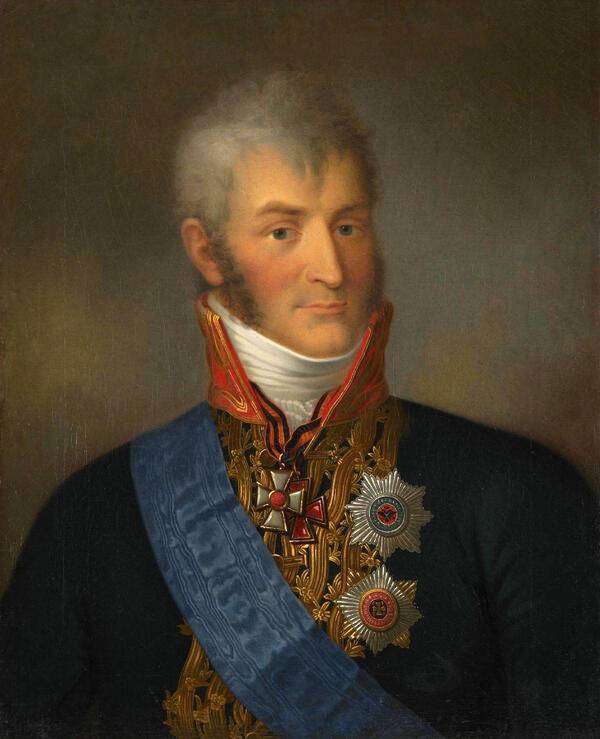
Nikolai Zubov in a portrait by an unknown artist
In January 1783 he received the rank of cornet, three years later he was promoted to lieutenant. And in 1789, after Platon Zubov became the lover of Catherine II, he was immediately promoted to lieutenant colonel. In this rank he went to the Southern Army, which acted against the Turks, where he became Potemkin’s adjutant on duty. He did not stay at the front: already on September 25, 1789, he arrived in St. Petersburg with the news of Suvorov’s victory at Rymnik - and immediately received the rank of colonel.
He was in the army during the Russian-Polish War of 1792, at the end of which Chief General M. Krechetnikov sent him to Catherine II with the keys to the city of Kamenets-Podolsky, which surrendered without a fight. The Empress took this as an occasion to promote her favorite's brother to major general and present him with a snuff box."with a monogram, sprinkled with diamonds».
In February 1793, the head of the Zubov family, Alexander, received the title of Count of the Holy Roman Empire, and “in descending order” all his sons, including Nicholas, became counts.
During the Polish uprising, which began with the massacre of unarmed soldiers going to church services ("Warsaw Matins", April 6, 1794), N. Zubov was with the commander-in-chief, General-in-Chief Osip Igelstrem, and together with other officers defended his headquarters for two days. On the third day, this small detachment with heavy losses (150 out of 400 people died) made its way through Warsaw, which was in the grip of an uprising, and united with units of the Prussians allied with the Russians. After this, Nikolai Zubov went to St. Petersburg and was the first to report the uprising to the empress. Returning to the army, on June 14, 1794, as a corps commander, he took part in the Battle of Soli, for which he received the rank of lieutenant general, a sword with diamonds and the court rank of equestrian. Among other awards, he was a holder of the Order of St. Andrew the First-Called and the Prussian Orders of the Black and Red Eagle. And in 1795, Nikolai Zubov married A.V. Suvorov’s only daughter, Natalya, who was 12 years younger than him.
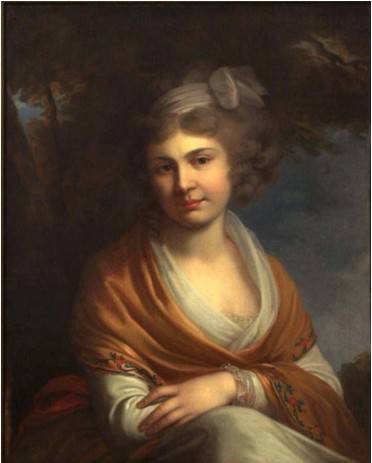
N. A. Suvorova in a portrait of an unknown artist
The great commander's relations with his new relatives were uneven: sometimes relatively good, sometimes teetering on the brink of a complete break. If with Nikolai and Olga Zubov he still tried to be correct and restrained, then Plato, without much hesitation, called a blockhead. In her marriage to N. Zubov, Natalya Suvorova gave birth to 7 children. One of her grandchildren became the founder of the Gatchina Museum, and her granddaughter married Pyotr Stolypin.
When on November 5, 1796, it became clear that Catherine II was dying, Nikolai Zubov was the first of the courtiers to go with this news to the heir to the throne, Grand Duke Pavel Petrovich. He had to wait a long time because he was having lunch at the Gatchina mill. As a result, a legend arose that Pavel was hiding from Nicholas, deciding that an envoy from St. Petersburg had come to arrest him.
By the way, it was precisely because of his relationship (through his daughter) with the Zubovs (and not because of any opposition to Paul I) that A.V. Suvorov later fell into disgrace.
About the participation of Nikolai Zubov in the conspiracy against Paul I and the famous “apoplectic blow to the temple with a snuff box"We'll talk a little later.
Ordinary man Dmitry Zubov
This brother of the favorite is the least interesting for researchers, since he lived a completely unremarkable life and did not become famous for anything.
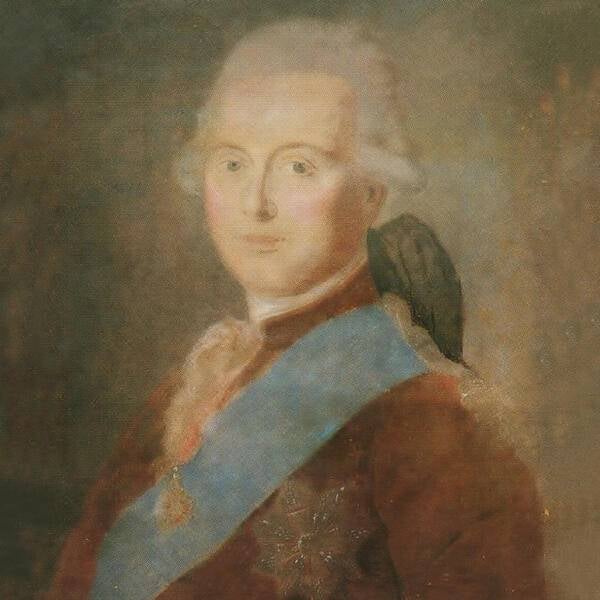
Dmitry Zubov in a portrait by an unknown artist, 1790
He was born in May 1764 and died in February 1836, outliving his more famous brothers. Like them, he began his service in the Horse Guards. Thanks to the patronage of his brother Plato, he received the court rank of chamber cadet, and then chamberlain. Gradually he rose to the rank of major general. However, Dmitry was not interested in either military or court service. He was engaged in commerce (state contracts, wine farming), although not very successfully, and became the Master of the Chair of the Three Luminaries lodge. After the death of Platon Zubov, Dmitry received a fantastic inheritance - 20 million rubles and several large estates in Lithuania. He was married to Princess Praskovya Vyazemskaya, who gave birth to four daughters and two sons. Special trace in stories his descendants did not leave.
Combat General Valerian Zubov
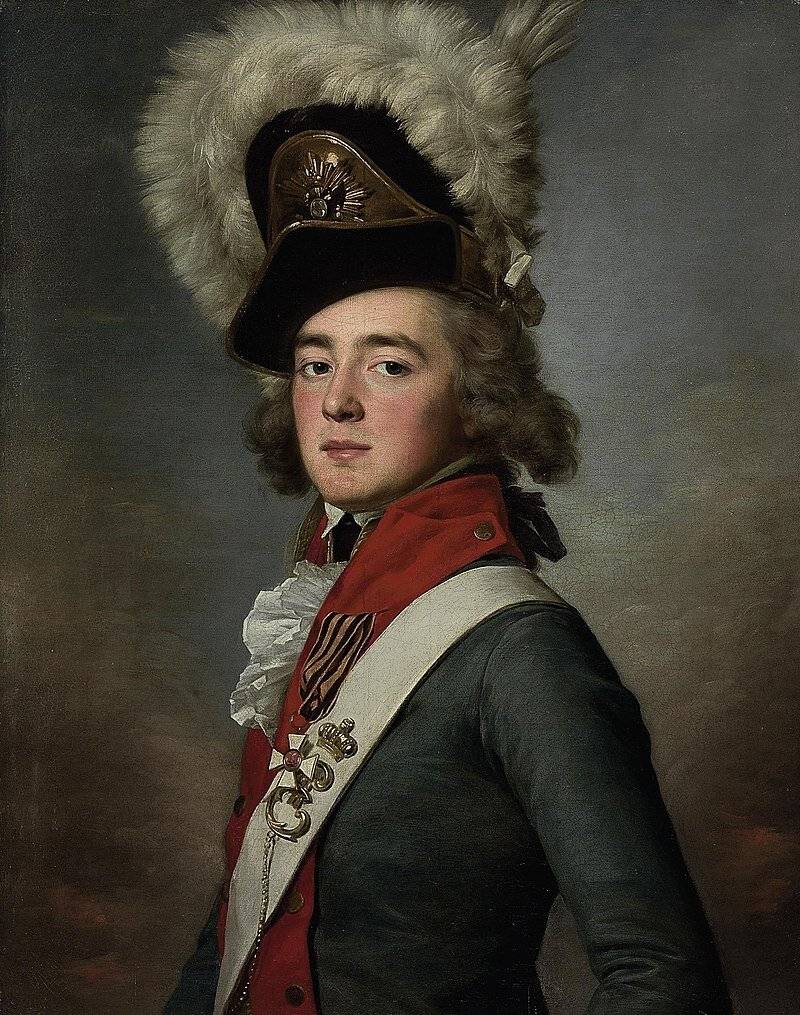
Valerian Zubov in a portrait of Jean-Louis Voil (1791)
The younger brother of Catherine II’s favorite was born in 1771. From childhood, he was enrolled in the Preobrazhensky Regiment, but at the time of his brother’s “incident,” 19-year-old Valerian had already been transferred to the Horse Guards and had the rank of second lieutenant. Plato contributed to his appointment to the guard of Tsarskoe Selo and immediately regretted it, since the empress really liked the handsome young man. As a result of the efforts of Platon Zubov, Valerian, who received the rank of lieutenant colonel of the guard, was urgently sent to the war with the Turks - to the army of Grigory Potemkin. In a letter to her secret husband, Catherine characterized Valerian as follows:
And in a letter to Valerian she told him that “All the beauties in the city lost weight without him"(this brother of her favorite was popular with the ladies).
Potemkin, unpleasantly surprised by the rise of Platon Zubov, who was “assigned” to the empress by his enemies and ill-wishers, received Valerian more than coldly. Almost immediately he tried to get rid of him, sending him to the capital with a report of Bendery’s capitulation. In St. Petersburg, Valerian received the rank of adjutant of the empress, the rank of colonel, the Order of St. George of the 4th degree, 10 thousand rubles in cash and jewelry in the same amount. And, to Potemkin’s surprise, he again appeared in the active army, taking part in the assault on Izmail, and in one of the most dangerous areas - at the Kiliya Gate. In December 1790, Potemkin again sent Valerian to St. Petersburg with the news of the capture of Izmail. It was then that he made his loud statement about “sick teeth”, telling Valerian goodbye:
But, as we know, the insignificant, infantile Platon Zubov turned out to be more valuable to Catherine II than the outstanding administrator Grigory Potemkin. And Valerian was again showered with awards: he became a brigadier and received the rank of captain-lieutenant of the Izmailovsky Life Guards Regiment. And in 1792 he became a major general.
It must be said that Valerian Zubov turned out to be a true warrior and did not stay in St. Petersburg for long. In 1792 he took part in the Polish campaign. In 1793, the Prussian king Friedrich Wilhelm II, allied with Russia, awarded Valerian Zubov the Orders of the Black and Red Eagle. Then the favorite’s brother fought a little as a volunteer against revolutionary France (War of the First Coalition). By the way, I then saw the bride of Grand Duke Alexander Pavlovich (daughter of the Margrave of Baden-Durlach, future Empress Elizaveta Alekseevna), who was just heading to St. Petersburg, and in a letter to Catherine II he gave a flattering review of her appearance.
In 1792, in Warsaw, he met Princess Maria Feodorovna Potocka (daughter of Prince Kaspar Lubomirski). Not bothered by a divorce from her husband, she began to live openly with the Russian general, which caused indignation among anti-Russian Polish aristocrats.
In 1794, Valerian, under the command of Suvorov, fought in Poland against the rebel army of Kosciuszko. By the way, it was in his corps that Lieutenant Colonel Pyotr Bagration served at that time. Here, during reconnaissance near the Western Bug River, Valerian Zubov was wounded by a cannonball in his left leg, and Colonel Rarok, who was next to him, was wounded by the same cannonball in his right leg. All the doctors' efforts were aimed at saving the life of the brother of the empress's favorite. Left without help, Rarok lost a lot of blood and died the next day. Zubov had to have his leg amputated, after which he was sent to St. Petersburg. To transport it, Catherine II sent an English carriage and allocated 10 thousand ducats for the journey. In addition, he was personally awarded 300 thousand rubles, a house on Millionnaya Street that once belonged to Gustav Biron, the Order of St. Andrew the First-Called and the rank of lieutenant general. After arriving in the capital, Valerian Zubov received an additional 20 thousand rubles in gold and a pension of 13 rubles in silver. Over time, English doctors made him such a successful prosthesis with a knee joint that he could ride a horse.
Persian campaign of Valerian Zubov
The cause of the war with Persia was the attack on Kartli and Kakheti in the summer of 1795 by the troops of the Persian Shah Aga Mohammed Qajar. The khans of Ganja and Erivan were his allies. The army of King Irakli II was defeated in the Battle of Krtsanisi, and the Persians occupied Tbilisi, carrying out a massacre there and completely plundering the city. Irakli II turned to Russia for help. At the same time, the brother of the Persian Shah, Murtaza Quli Khan, arrived in St. Petersburg with a request for help. Catherine II decided to help both. In 1796, the restless one-legged Valerian Zubov received the post of governor-general of the Caucasian governorship and command of the 35-strong Caspian Corps. Together with the count, his mistress, Princess Maria Pototskaya, went to the Caucasus.
Russian troops began their movement in April 1796, and already on May 10, the strong fortress of Derbent, which was called the “gate of the Caucasus” (sometimes “Iron”, sometimes “Golden”), was taken. They say that some ancient old man brought Valerian Zubov the keys to the city, which had previously been given to Peter I. Gavariil Derzhavin, who learned about this, wrote an ode containing the following lines:
You have multiplied with a new victory;
The more glorious is the crown of laurel,
Why did you take Petrov’s keys?
In a hundred year old man
Darius is staring,
And young Alexander is in you!
And Catherine II wrote to him that in two months he did what Peter I did in two years. Some pre-revolutionary authors who were negatively disposed towards the Zubov family cited these words as an example of how much the mental abilities of this empress weakened shortly before her death.
By November, the Russians had conquered a number of khanates, including Derbent, Kuba, Baku, Kazikumykh, Shirvan, Karabagh, Sheki and Ganzhin.
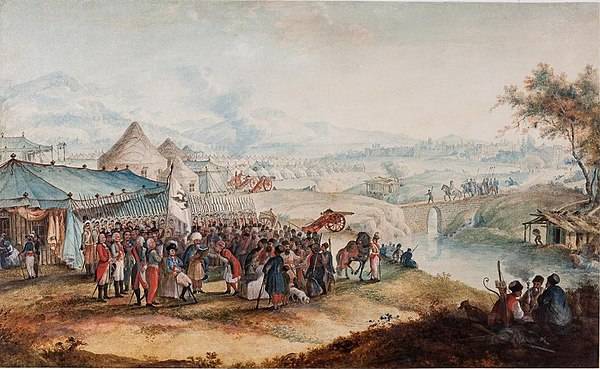
Taking the oath of citizenship of Novoshemakha Gasim Khan among the Russian corps under the command of Count V. A. Zubov at the Aksuchai River in 1796
Valerian Zubov, who received the rank of general-in-chief, planned to move the army to Tehran, but after the death of Catherine II, an order came from St. Petersburg to end the war. From the very beginning, Paul I had a negative attitude towards this campaign, believing that Russia was fighting for other people’s interests; moreover, the funds already spent during this campaign seemed excessive to him. And the fantastic plan promoted by Platon Zubov provided for a turn to the borders of Turkey and a march to Constantinople through Asia Minor. It was clear to everyone that this would require a several-fold increase in the number of troops involved and funding - and this in the context of an extremely tense situation in Europe. And this was only the first part of the plan of the “great strategist” Platon Zubov, who assumed that the second army should go to Constantinople through the Balkans, and the fleet should attack the Ottoman capital from the sea. The second army was to be led to the Ottoman capital by Suvorov, and fleet command... Catherine II! The order to stop the operation and return the army to Russia was quite reasonable, but it was given, bypassing Valerian Zubov - directly by the commanders of large units. This could lead to disorganization of the movement of Russian troops and put them at risk of attacks from the already almost defeated Persians. Some researchers believe that the reason for the unexpected arrest of Ataman Matvey Platov (who ultimately spent three years in the Peter and Paul Fortress) was the failure to comply with this imperial order. Platov, unlike other commanders, did not lead his Cossacks separately, but remained with the commander, which made it possible to provide cover for the rest of the army. And Valerian Zubov was dismissed even before returning to St. Petersburg. So he, the only one of the brothers, had reasons to be offended by Paul I - and quite weighty ones.
Meanwhile, G. Derzhavin wrote another ode - “On the return of Count Zubov from Persia”:
You passed through the Caucasus with the army...
Who has been in a thousand battles
Invincible, but won;
No need for glitter, no need for decorations
To the one who conquered the kingdom!
In 1803, he married the widowed Princess Potocka, who immediately began to cheat on him with numerous admirers.
We will talk about Valerian Zubov’s participation in the conspiracy against Paul I later.
Olga Zubova-Zherebtsova, a born intriguer
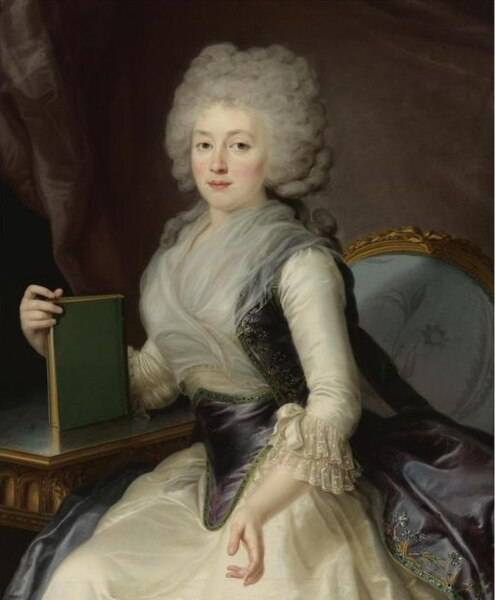
Jean Louis Veil. Portrait of O. Zherebtsova, 1790s.
The sister of the Zubov brothers was born in 1765. At the age of 15, she was married to chamberlain Alexander Alekseevich Zherebtsov, with whom she gave birth to a son and a daughter, after which she lost interest in both her husband and children. Moreover, brother Plato “fell into an accident”; Olga was appointed lady of state (later she also received the Order of St. Catherine), and she had the opportunity to regularly appear both in the royal palace and in the secular slopes of the highest aristocrats of the empire. She even “flirted” with Grand Duke Paul, but then she chose the English envoy Charles Whitworth, who “followed in the footsteps” of his uncle, Baron George Charles Whitworth, the British ambassador to the court of Peter I. In 1797, Charles Whitworth managed to achieve the signing of a very a trade agreement with Russia that was beneficial for his country, and in 1798 - an alliance treaty against France. Paul I even petitioned King George III to grant Whitworth a peerage.
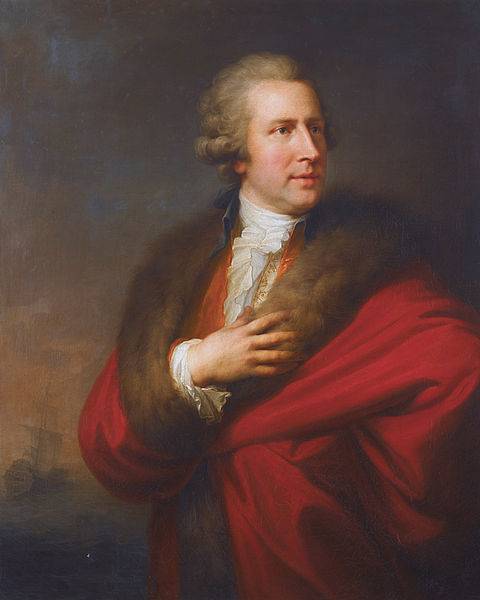
Earl Charles Whitworth in a portrait by Giovanni Battista
But then, as you remember, relations between Britain and Russia went wrong, and Whitworth began to give Russian aristocrats ideas about recognizing Paul I as crazy and establishing a regency over him. It didn’t take long to persuade anyone, since the severity of the new emperor extremely “strained” the nobles of Catherine’s Golden Age, who during the long reign of this empress had simply become unaccustomed to normal service. The officers of the corrupted guards regiments were especially unhappy.
The Zubov brothers after the accession of Paul I
A. S. Pushkin wrote about the death of Catherine II:
Nice and a little bit prodigal
Voltaire was the first friend
She wrote the order, she burned the fleets,
And she died while boarding the ship.
(The vessel in this case is not a ship).
After the death of the empress, many expected that Paul I would take revenge for his previous humiliations - and they were mistaken. At first, even Platon Zubov, who treated him arrogantly, did not fall into disgrace. The new emperor immediately declared to his former favorite:
Yes, he relieved Platon Zubov of 36 (!) government positions, but retained his post as artillery inspector. Instead of premises in the palace, a house on Morskaya Street, furnished with furniture, was bought for the former favorite for 200 thousand rubles. Not satisfied with this, Pavel ordered horses and carriages, as well as silver and gold cutlery, to be sent to Zubov. The temporary worker's brother Nikolai, 4 days after Paul's accession to the throne, was promoted to chief of horsemen and appointed president of the Court Stables Office. The son of Olga Zherebtsova became an actual chamberlain.
However, gradually numerous facts of abuse on the part of Platon Zubov, as well as his obvious neglect of duties in his positions, began to be revealed. As a result, in imperial orders for the guards corps, the name Zubov was often mentioned as a synonym for a careless person who was completely ignorant of the rules of service.
The last straw was the discovery of violations due to the fault of Feldzeichmeister General P. Zubov in the work of the Sestroretsk factories, which is why the soldiers of the Preobrazhensky and Horse Guards regiments did not receive guns and the necessary equipment. They collected 50 thousand rubles from Plato, the estates granted to him were transferred to the treasury, and he himself was ordered to go abroad. Nikolai Zubov was secretly advised to leave St. Petersburg, and he settled in Moscow. Valerian also went to the estate near Moscow. Let us say right away that all the estates were returned to Platon Zubov at the request of Kutaisov in 1800, and at the same time the brothers received permission to return to St. Petersburg, which was a big mistake of Paul I.
A tragicomic story is connected with the departure of Platon Zubov, which, nevertheless, had great consequences. By order of Paul I, Peter Palen, the ruler of the Riga viceroyalty and the governor-general of Courland, prepared a solemn welcome for the former king of the Polish-Lithuanian Commonwealth Stanislav Poniatovsky (who until that time was in Grodno) on his way to St. Petersburg. However, he passed by Riga, but Platon Zubov ended up in the city on his way abroad, whom Palen, in the absence of a king, invited to a gala dinner. It is difficult to say what it was: a thoughtlessness or a conscious challenge to the emperor? But Pavel’s reaction turned out to be quite predictable - Palen was dismissed. True, later Paul brought him closer to himself, appointing him governor-general of St. Petersburg, inspector of six military colleges, director of posts, member of the board of foreign affairs, and chancellor of the Order of Malta. But the sediment apparently remained, and Palen played a crucial role in organizing the conspiracy against the emperor.
We will talk about Paul I, the conspiracy against this emperor and the participation in it of the Zubov brothers and Olga Zherebtsova in separate articles.
Information